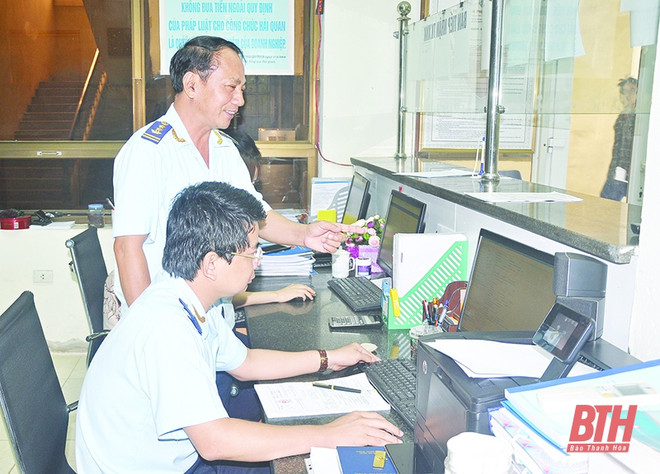 Thanh Hoa customs officers are trying to reform administrative procedures, aiming to create maximum convenience for enterprises. (Photo: baothanhhoa.vn)
Thanh Hoa customs officers are trying to reform administrative procedures, aiming to create maximum convenience for enterprises. (Photo: baothanhhoa.vn)Hanoi (VNA) – Thanh Hoa Customs Department is carrying out solutions to reform its administrative procedures, aiming to create maximum convenience for enterprises engaged in export and import activities, helping them save time and cost.
Since the beginning of this year, the department has closely followed the assigned tasks, effectively implemented the one-stop-shop mechanism in handling administrative procedures.
Procedures along with necessary documents and papers as well as phone numbers and email addresses of customs units in charge of each kind of procedures are fully publicised so enterprises and individuals can easily monitor and follow.
The department has coordinated with the State Treasury, Tax Department and commercial banks in the province to create favourable conditions for businesses who are encouraged to adopt electronic tax payment and 24/7 customs clearance to further promote administrative reform, contributing to saving time for businesses.
It has also continued with reception of citizens and promptly solved difficulties arising during processing procedures for businesses and individuals. All complaints sent to the department were dealt with in line with State regulations.
The customs department has stepped up innovation in the process of receiving and handling administrative procedures, and building e-government.
To facilitate export and import activities, it has focused on the implementation of the e-customs procedure in the system VNACCS/VCIS (Vietnam Automated Cargo And Port Consolidated System/Vietnam Customs Intelligence Information System) and other customs software.
The online processing of customs procedures has brought about many benefits to businesses compared to the traditional method, according to the department.
Customs declaration can be made anywhere and anytime, and the time for customs clearance is reduced, thus enhancing competitiveness for enterprises. For customs authorities, the goods supervision and management system helps save time as well as limit trade fraud.
Last year, Thanh Hoa Customs Department handled procedures for 5,573 vehicles carrying goods for export and import and 84,340 customs declarations, with a total export value of 8.5 billion USD.
In the future, in addition to continuing to effectively operating the current VNACCS/VCIS electronic clearance system, the department will deploy most customs procedures services online at the third and fourth levels.
Risk management will also be applied in all stages of customs operations as well as measures to encourage voluntary legal compliance among the business community. The efficiency of supervision and control of imported and exported goods will be enhanced at the same time, it said.
In mid-July, the Government issued Resolution No. 76/NQ-CP approving a master plan on state administration reform for the 2021-30 period.
Under the plan, the Government will focus on six areas, namely institutional reform, administrative procedure reform, organisational reform of the State administrative apparatus, civil service reform, public finance reform, and development of e-Government and digital government.
For administrative procedure reform, the Government targets to cut or simplify at least 20 percent of procedures and 20 percent of the compliance costs regarding business-related procedures by 2025, reported the Vietnam government portal (VGP). At least 80 percent of administrative procedures of ministries, agencies and localities will be provided online at levels 3 and 4.
By 2030, at least 90 percent of procedures under ministries, agencies and localities will be provided online at levels 3 and 4.
Online public services in Vietnam are classified into four levels, depending on the tasks that can be performed digitally.
At the first level, users can access information online regarding the service, including procedures, required papers, deadlines, fees and service charges.
The second level allows users to download the required forms to be printed and filled in later.
The third level allows applicants to fill and submit the forms online, however, they still have to pay fees at the relevant government bodies.
Meanwhile, the fourth level means service payments can be settled online./.





























